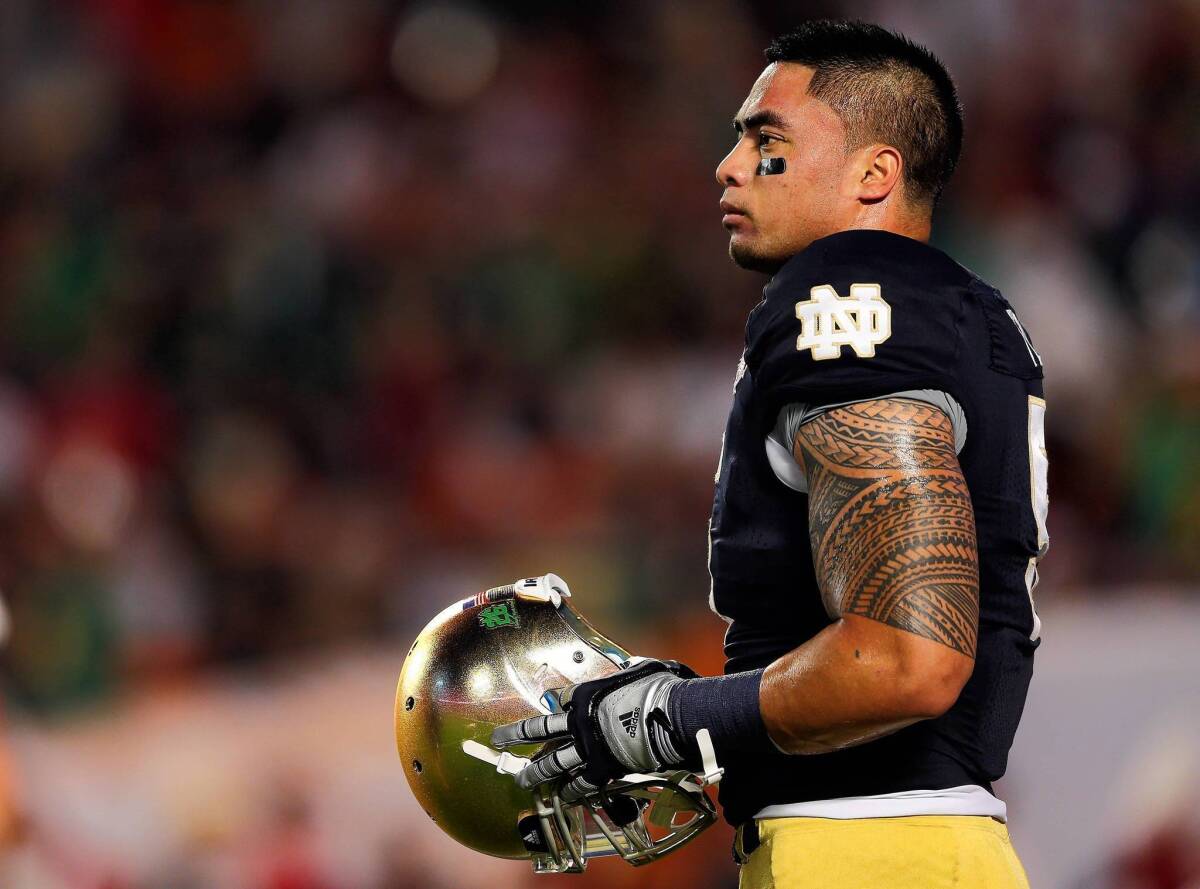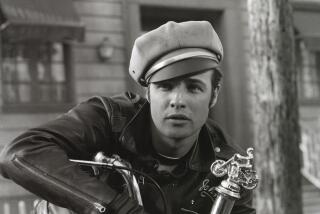Lance Armstrong and Manti Te’o get trapped in a good story

How we love stories — the more movie-like the better. How we wish that life itself were more like the tales we see at our multiplexes and how much life has conformed to those wishes.
All of this hit us with an especially loud and awful thud in recent days when onetime cyclist hero Lance Armstrong confessed to Oprah Winfrey that he had used performance-enhancing drugs and Notre Dame star linebacker Manti Te’o admitted to having been duped into believing that a Twitter contact had developed, sight unseen, into a virtual romance and that the stories of her sudden death were fabrications.
Lying or being hoodwinked is hardly new. But when you listen closely to Armstrong’s explanation and rationalization, there is something distinctly modern about it. We all know that through a terrible act of God, Armstrong had been struck by testicular cancer that migrated to his brain. Somehow he managed not only to defeat the malignancy but was also able to return to cycling. That alone would have been a good story — an inspiring story, a Page 30 People magazine story, a smallish popular book story. It gave one a lift.
PHOTOS: TV apologies and confessions
But it wasn’t quite Hollywood good or People cover good or bestseller good. To be that good, Armstrong not only had to race, he also had to win what is arguably the most arduous sporting event of all: the Tour de France. That was the only way he could fulfill the narrative — for himself and presumably for his sponsors, the media and us. To win, however, he had to cheat, and to maintain this new, miraculous narrative, he had to keep denying he cheated.
As Armstrong himself put it to Oprah, once he had won, he was essentially trapped in his own narrative (his word). He saw himself as a star who was giving the audience what it wanted, what it loved, but the story was always too good to be true, which is precisely why everyone ate it up. In effect, Armstrong was saying, “Hollywood made me do it.” He had to one-up the movies. He had to turn his entire life into a movie that went beyond the usual Hollywood contrivance.
The measure of Armstrong’s screenwriting genius is that he even incorporated his own denials as a major plot point. The cycling establishment was out to get him, he insisted. It wanted to rob him of his achievement, and in robbing him it was also, of course, robbing us of the feel-good story of the decade. Armstrong became both an athletic hero and a David against the bureaucratic Goliaths, thus merging two of our most popular film genres.
Whether Te’o is a stooge, as he says, or an active participant in a con, as some believe, he was also furnishing a popular and salable narrative, which at the very least makes him a willing dupe. The media — and the public — loved the story of Te’o losing his beloved grandmother and his girlfriend, who had survived a serious auto accident only to be felled by leukemia. And both within a day of each other — a day! — and yet Te’o soldiering on to lead Notre Dame past Michigan State because his girlfriend’s dying wish was that he go out and do so.
Talk about too good to be true. And Te’o not only won, he went on to hawk the story of the tragedies he overcame to get that victory even, he now says, after he knew that there was no girlfriend, because while he may not have understood the machinations behind Twitter, he seemed to understand fully the road to popularity. The “movie” made him someone special. Otherwise, he was just another decent athlete. The movie was the place where old-fashioned heroism and new-fashioned celebrity converged, and like Armstrong, he found himself trapped in the story.
Fourteen years ago, in my book “Life: The Movie,” I wrote about a growing phenomenon in America in which life itself was being transformed into an entertainment medium, often usurping more traditional entertainment media. I attributed this to many things, perhaps chief of which was the extent to which we had lived so long in a nimbus of constant entertainment, where music, television, novels and especially movies had infiltrated our imaginations, that these became the matrices for our lives and the bars for the heights of our expectations.
Whether it was a matter of us just becoming too jaded with our mundane reality or too hyped by fictions, we had come to demand more of life. We wanted reality to measure up. Maybe we even wanted reality to challenge the artifices of traditional entertainments — artifices like scripts and stars.
Reality programs, which, of course, have nothing whatsoever to do with reality, are one manifestation of the desire for real life to be more exciting. But it is not only Kim Kardashian, Honey Boo Boo, “Real Housewives,” Armstrong and Te’o who live in a movie. We all do, and we are willing to suspend our disbelief if the story is good enough.
Armstrong counted on it. He gave us a nearly decade-long saga of heroism and courage — albeit phony. We gave him our love and a reported $125-million fortune in return. Te’o gave us a tear-jerker. We gave him our admiration and sympathy, and if the girlfriend hadn’t been exposed as bogus, probably we would have given him a boatload of money too.
If there is any irony in this, it is that Armstrong’s confession and Te’o’s bizarre story of entrapment have simply become another chapter in their movies — new plot twists. Yes, theirs are no longer heartening tales about overcoming tragedy and demonstrating grit, but Armstrong is still dominating the media and Te’o is getting more attention for his make-believe girlfriend than he got for his tackles. In short, while Armstrong’s heroism is gone, and so too might be Te’o’s, their movies continue, because when life is a movie, all you really want are entertaining plots. The inspiration is gravy — too good to be true.
Gabler, author of “An Empire of Their Own: How the Jews Invented Hollywood,” “Walt Disney: The Triumph of the American Imagination” and other books, is writing a biography of Sen. Edward M. Kennedy.
ALSO:
Manti Te’o says he lied after learning girlfriend didn’t exist
Lance Armstrong reveals his most humbling moment to Oprah
Oprah’s Lance Armstrong interview seen by 28 million worldwide
PHOTOS AND MORE
VIDEO: The making of ‘Argo,’ ‘Les Miz’ and more
ENVELOPE: The latest awards buzz
PHOTOS: NC-17 movies: Ratings explained
More to Read
Only good movies
Get the Indie Focus newsletter, Mark Olsen's weekly guide to the world of cinema.
You may occasionally receive promotional content from the Los Angeles Times.






